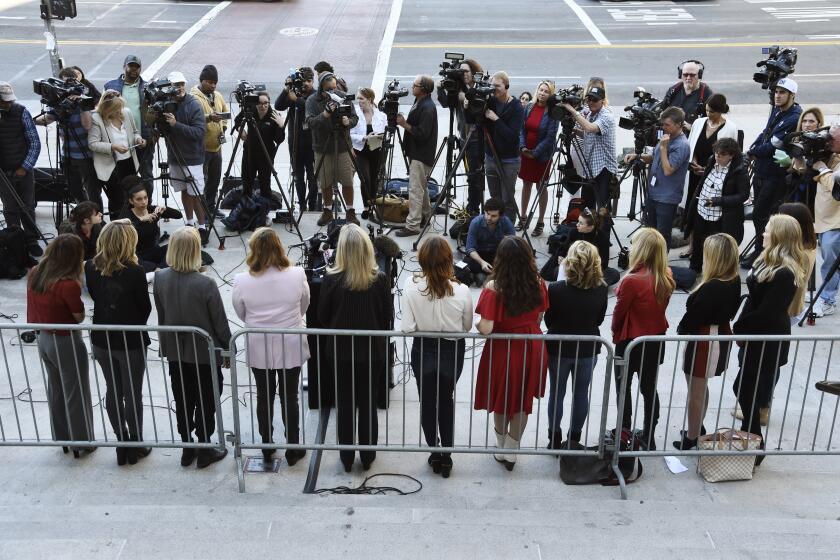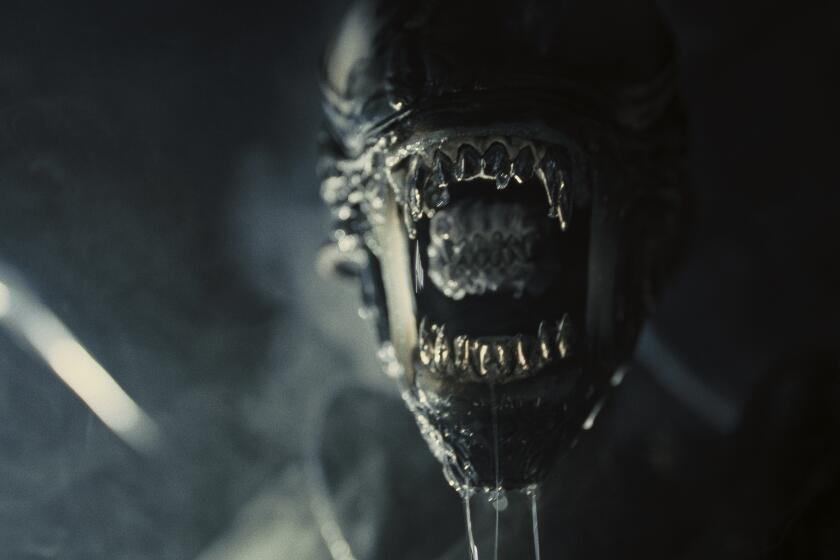‘Taj’ fascinating but a little flat
Playhouse staging of bloody Rajiv Joseph play is well acted but puzzling
You wouldn’t call “Guards at the Taj” bloodless, exactly — even without the puddles of crimson liquid the actors slosh and slip around in about halfway through Rajiv Joseph’s play.
The piece, whose just-opened La Jolla Playhouse staging is only its third, has its moments of passion and lyricism and history-laced wisdom. And Joseph’s meditations on moral responsibility can cut nearly as deep as his characters’ shimmering scimitars.
But for much of director Jaime Castañeda’s production, the emotional tone can feel muted. “Taj” contains an audacious mix of both humor and horror, but there’s a sense here that some of the edge has been filed off both those qualities.
“Guards at the Taj”
When: 7:30 p.m. Tuesdays-Wednesdays; 8 p.m. Thursdays-Fridays; 2 and 8 p.m. Saturdays; 2 and 7 p.m. Sundays. Through Feb. 28.
Where: La Jolla Playhouse’s Potiker Theatre, 2910 La Jolla Village Drive (Playhouse / UC San Diego Theatre District)
Tickets: About $20-$59 (discounts available)
Phone: (858) 550-1010
Online: lajollaplayhouse.org
Joseph — a Pulitzer Prize finalist in 2010 for “Bengal Tiger at the Baghdad Zoo” — sets up a tough challenge from the start, because “Taj” is essentially an epic story told obliquely by two characters (with a bit of awkward story exposition early on in the 75-minute, intermissionless show).
They are Humayun (Manu Narayan) and Babur (Babak Tafti), the titular guards who stand sentry in front of what is about to be unveiled as the greatest wonder of the world, man-made or otherwise (at least in the eyes of its creators).
It is, you might’ve guessed, the Taj Mahal, and after 16 years and the labors of some 20,000 men, the monumental, blinding-white edifice is set to be unveiled at first light on this morning in 1648.
The guards are under strict orders not to turn around and gaze at the Taj. But Babur, a young dreamer who almost reflexively questions every rule and bit of received wisdom, can’t resist, and he goads Humayun — the smug and officious son of a top official — to join him.
It’s a bit like Abbott & Costello (or, if you prefer, Beavis and Butt-Head) encountering Eve’s apple. (There’s also much about this pair that’s reminiscent of the mystified, doomed duo who catch glimpses of tragedy in “Rosencrantz and Guildenstern Are Dead”).
The Eden allusion fits here because both men have a soft spot for birds (whose trills and squawks are heard periodically) and for memories of boyhood idylls in nature; Babur also shares his amusing vision of a “space palanquin,” or flying litter, that could be used to escape the dreariness of this world.
Such adventures are not to be. Humayun clues Babur in to a rumor about what’s going to happen to those 20,000 workers who built the Taj, which is seen here (in Takeshi Kata’s spare but ingenious set design) as bare outlines of domes etched into a gleaming silver backdrop.
Soon enough, rumor becomes horrid fact, with the two guards assigned the unbelievably gruesome duty. (The events put a morbid spin on the “two-hander,” the theatrical phrase for a dual-character play.)
If Castañeda, the Playhouse associate artistic director who is making his directorial debut at the theater, could stand to inject a greater dynamic range to the emotions here, he still does well by his actors; Tafti is funny and full of wonder as Babur, while Narayan projects an excellent straight-man sensibility as well as a feel of meticulously repressed desperation.
Their characters cope with the aftermath of their actions in very different ways: “What we did was terrible,” an agitated Babur laments, to which Humayun responds: “It was our job.”
They also deal by not dealing — engaging in innocuous banter and savoring the possibility that their deeds might earn them harem duty.
But Joseph makes clear the weight of their complicity (something we can easily translate to our own times, as subjects of a government whose dirty work we don’t always want to know about), as well as the idea that those on the lowest rung don’t generally have much choice in such matters.
Babur agonizes late in the play that he personally killed beauty by helping ensure it’s never created again. But if it’s one tiny consolation, at least he still knows what it is.
Get U-T Arts & Culture on Thursdays
A San Diego insider’s look at what talented artists are bringing to the stage, screen, galleries and more.
You may occasionally receive promotional content from the San Diego Union-Tribune.








